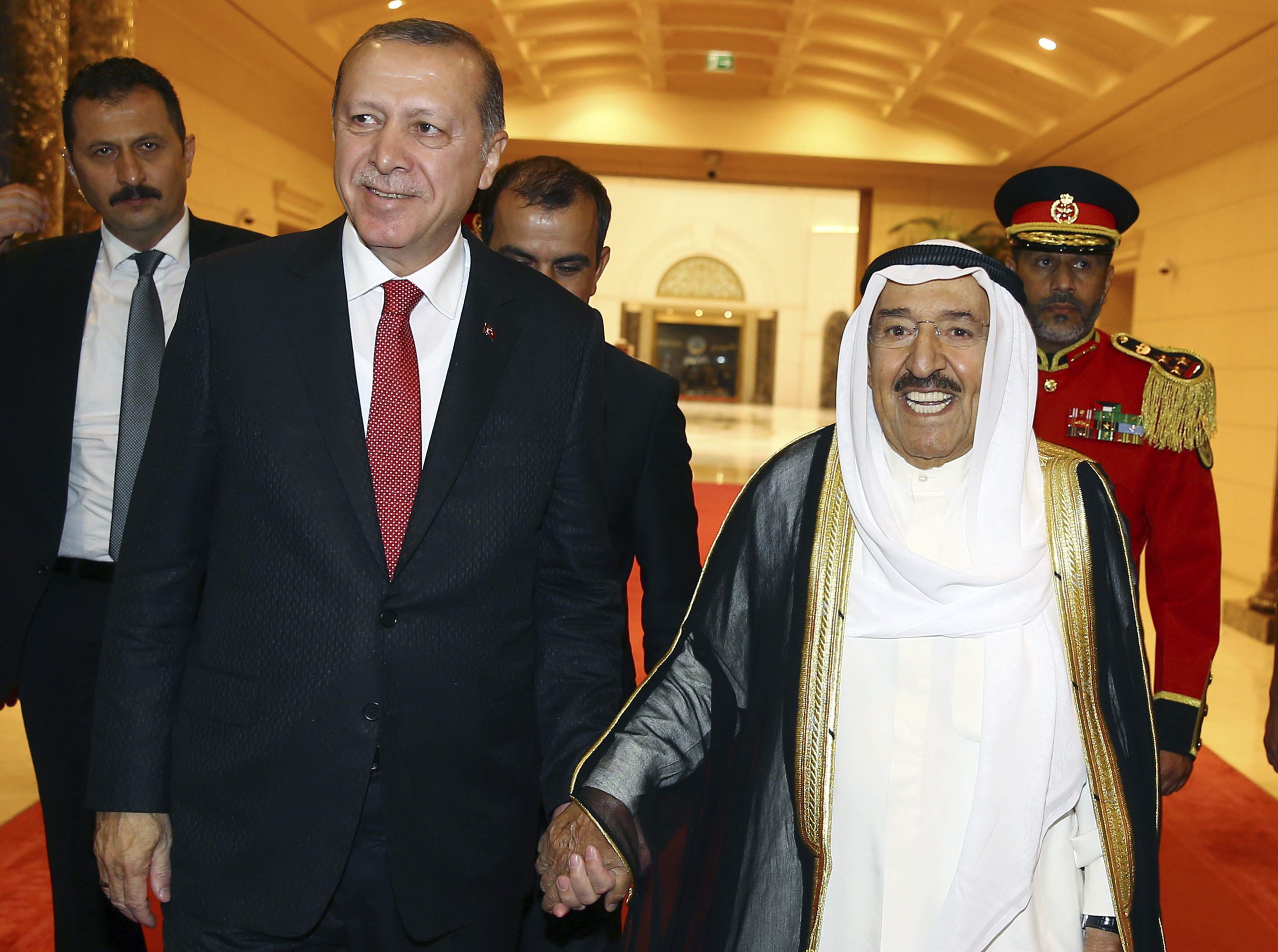
A KING, A PRINCE AND A SULTAN
Erdogan holds talks with Kuwaiti monarch but MbS looms large

After a day of talks with Vladimir Putin, Turkey’s president will arrive in Kuwait today for talks on the ongoing blockade of Qatar.
Ankara has been steadfast in its support for the Gulf emirate—delivering food within 24 hours of the blockade and maintaining a sizeable troop presence in the country, despite the Saudi-led bloc demanding they leave. Underlying much of this cooperation is a similar pro-Islamist regional outlook.
President Erdogan insists that the isolation of Qatar must end and will today discuss ways in which Kuwait’s mediocre mediation efforts can be accelerated.
But real power lies in Riyadh. There, Crown Prince Mohammad bin Salman—widely believed to be the architect of the Qatar blockade—appears to be laying the groundwork for royal ascension. His father, King Salman, reportedly suffers from dementia, leaving “MbS” to effectively run the Kingdom.
MbS is currently rolling out a potent anti-Iran strategy, confronting Tehran’s influence in Lebanon and Iraq while consolidating power at home with an ‘anti-corruption’ drive. To welcome Iran-friendly Qatar back into the fold now seems unlikely—that will probably have to wait until after the crown prince becomes king.
ONWARDS TO BREXIT
Brexit bill faces barrage of amendments at committee

In September, the British House of Commons passed the broad outlines of a bill to take the country out of the European Union. Today, the bill goes to committee to face nearly 400 proposed amendments before a “third reading” vote solidifies the bill into law.
In order to maintain regulatory continuity, the proposal enshrines thousands of EU regulations into UK law. Given the impossibility of transferring so many complex laws in any reasonable timeframe, the bill also grants cabinet ministers sweeping “Henry VIII” powers to adjust regulations without parliamentary approval.
However, blowback to the bill from parliamentary and regional opposition is unlikely to stymie momentum towards Brexit. The ruling conservative government will likely pass any bill handed to it, and the Henry VIII powers allow the government to make Brexit as hard or as soft as it pleases. This will only facilitate PM May’s drive towards a harder Brexit.
Delve Deeper: Divided we fall: the United Kingdom’s divisive general election
ROMAN REVIVAL
Italy expected to post economic growth

Italy’s third-quarter GDP figures will be released today. They are expected to show a slight uptick to 0.5% from last quarter’s 0.3% growth.
The figures point to an Italian economy that is finally seeing a recovery—albeit a slow one—from the global financial crisis. Italy has posted four straight months of increasing industrial growth–until a small dip this month–and has seen its sky-high unemployment rate trend downward.
Prime Minister Paolo Gentiloni’s government has forecast growth of 1.5% for the year. If he meets that projection, it would be Italy’s best showing since 2010. Yet, Italy lags within the EU, which is projected to see 2.2% growth this year.
As long as structural problems remain, recovery will be limited; the public debt of 132% of GDP is staggering, corruption is rampant and education is underfunded. Those headaches and more probably won’t be fixed soon—next year’s general election will likely result in an unwieldy minority or coalition government more concerned with internal squabbling than economic management.
RENEWED INTEREST
Chilean central bank debates rate adjustment

Today the Central Bank of Chile will decide whether to lower the country’s interest rate or maintain it at 2.5% for the sixth month straight.
After a quarter-century of impressive expansion, Chile’s economy has stagnated in the past 4 years amid rising commodity prices, growing by less than a percent in 2016. Despite dropping the interest rate a point since early 2017, the 1.8% inflation remains under the 2-4% target.
Dissatisfaction with economic sluggishness has built support for the presidential campaign of right-wing businessman and former president Sebastián Piñera. The prospect of a business-friendly Piñera victory over the ruling centre-left coalition has encouraged investors, raising the Chilean stock market 28%.
However, some positive economic indicators have emerged. Growth is expected to accelerate to 2.6% in 2018, and unemployment remains at a modest 6.7%. With inflation low, but not abysmal, the central bank is likely to maintain interest rates. Expect Chilean growth to rebound in the coming years, but still stay below its halcyon days of supercharged expansion.
HAPPENING ELSEWHERE…
Kenyan Supreme Court considers final challenges to rerun vote

Kenya’s top court has until today to rule on challenges to last month’s rerun presidential election, which saw incumbent Uhuru Kenyatta clinch victory. Mr Kenyatta claimed over 98% of the vote after opposition leader Raila Odinga boycotted the election, citing concerns about the impartiality of the electoral commission. If the Supreme Court dismisses the challenges, President Kenyatta will be sworn in for a second term on November 28. If not, political instability is likely to continue in the East African powerhouse.
Iraq’s government has set today as the deadline for privately owned banks to shutter their branches in the Kurdistan region. Baghdad has imposed a range of punitive sanctions on the autonomous region—including stemming foreign currency reserves and banning international flights—after Kurdish leaders held a controversial independence referendum on September 25. Kurdistan’s oil exports through a Turkish pipeline dropped by almost a third in October, causing jitters among investors.
EU lawmakers are expected to discuss the Paradise Papers leak.

